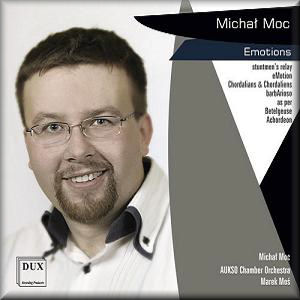 |
 |
|


alternatively
CD: MDT
AmazonUK
AmazonUS
|
Michal MOC (b.1977)
Emotions
Stuntmen's Relay, for orchestra (2008) [8:28]
eMotion, for string orchestra (2011) [10:23]
Chordalians & Chordaliens, for accordion and chamber
orchestra (2004) [8:00]
BarbArioso, for (youth) string orchestra (2009) [5:45]
As Per, for string orchestra (2007) [6:24]
Betelgeuse, for accordion and tape (1999/2000) [8:42]
Achordeon, for string orchestra and tape (2007) [6:14]
 Michal Moc (accordion)
Michal Moc (accordion)
AUKSO Chamber Orchestra of Tychy/Marek Mos'
rec. Karol Szymanowski Music Academy Concert Hall, Katowice, July
2011; February 2008 (Chordalians); Witold Lutos?awski Concert Studio,
Polish Radio, Warsaw, June 2011 (Betelgeuse). DDD
 DUX 0756 [56:03]
DUX 0756 [56:03]
|
|
|
This CD is part of a series published by Polish label DUX entitled
'Young Composers in Homage to Frédéric Chopin'.
It’s a four-year Franco-Polish project to sponsor 13 talented
young(ish) musicians. A recent disc in the same series, devoted
to the music of the Czech composer Kryštof Maratka (b.1972),
was reviewed here.
As the volume title suggests, Michal Moc's music is concerned
with emotions. Polish critic Beata Boleslawska-Lewandowska elaborates
in her booklet notes: "'For me, there is no music
without emotion', claims the composer. To come up with
such a declaration in the contemporary musical world, marked
by the experience of the avant-garde which rejects all manner
of emotionality in the arts, still requires a good deal of courage."
Whether that needs to be said about any composer or not, and whether Boles?awska-Lewandowska's slightly obsequious remark is even valid, the internet-age title of Moc's longest work here, eMotion, hints in any case that the emotions to be found in his music are of the modern rather than romantic variety. His is not in any case 'softie' music; his surname means 'vigour' in Polish, and the works in this debut monograph are unabashedly masculine.
Moc (pronounced 'mots') smiles cheerfully out from the CD cover, and on the back can be seen posing almost matily with his own instrument, the accordion: on the face of it a folksy anachronism. Yet though the accordion often harks fleetingly back to rustic music, Moc's past, by his own admission, is the "Polish sonorism of the 1960s". That much is evident in his newest work, eMotions for string orchestra, the mysterious, dissonant sound-world of which is reminiscent at times of early Penderecki and Lutos?awski. It has its fair share of avant-gardisms in the form of improvised extra-musical input from the players - mutterings and pantings - in the last two sections.
A curious basis for a homage to Chopin? Certainly, but Moc is no unreconstructed modernist, and lyricism and structure do also have a role in his music, even in eMotions, which is a surprisingly memorable work. There is more of Lutos?awski in the oddly-named Stuntmen's Relay, where Moc employs so-called 'controlled aleatoricism'. By now Boles?awska-Lewandowska's notes appear to be subject to a certain degree of aleatoricism themselves, reaching a descriptive opaqueness much favoured by post-modernists, and not aided by dodgy translation. The Stuntmen of the title are the performers who face a rather extreme test of virtuosity of Moc's devising, yet once again the music emerges less rhetorical, more compelling than it sounds on paper.
Word games feature also in Chordalians & Chordaliens (Moc's ampersand) - strings and chords in alliance and alienation. By this point in the programme it is clear that Moc is not only a superb orchestrator, but one brimming with musical ideas - and he plays a mean accordion. This is one of the more accessible pieces on the disc, with borrowings from Impressionism, Romanticism, folk music and even minimalism jostling in a bubbling hotpot of energetic, ambiguous motifs.
Moc combines the musical terms barbaro and arioso for his work written especially for a youth string orchestra, BarbArioso. Here at last are some "distant motivic references to Chopin's music" - very distant! Yet the work, designed to be fun for youngsters to play, is basically tonal, lightly textured and foot-tappingly effervescent.
The final three works are labelled as being "from the polypticon ... ad astra". Unfortunately no further explanation is given as to what that means, beyond that they are "selected elements of the musical polyptych which have a common sound material". It matters little: the works are clearly related - Achordeon and As Per are the same piece, one with an overlaid tape part, one without - but they stand up well on their own. As Per is another dark, rather menacing work recalling 1960s Penderecki. Whether or not the low-key computer element adds anything of substance is a moot point, but it does at least underline Moc's musical roots. Betelgeuse takes its title from the heavenly body, though according to the notes - still emitting less light than a distant star - the music is more purely abstract than cosmological. Nonetheless, there is certainly a spooky extra-terrestrial aspect to the tape part, which runs more or less in dialogue with the virtuosic accordionist - to noisy but arresting effect too, it must be said.
The CD is rather on the short side, but Moc as composer and performer, with the very impressive assistance under Marek Mos' of the AUKSO Chamber Orchestra from the Silesian city of Tychy, leaves the listener with plenty to digest and remember. Truthfully, Moc's music may be a little too modernistic for ears more attuned to the first half of the twentieth century and before, but the more adventurous listener should find in Moc a voice of some considerable originality.
Sound quality is pretty good. The English-Polish booklet is detailed and informative, let down only by the logorrheic language and/or dubious translation of the notes.
Byzantion
Collected reviews and contact at reviews.gramma.co.uk
|
|




 All Nimbus reviews
All Nimbus reviews








